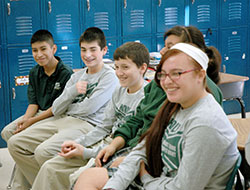Catholic Schools Week Supplement
Focus on seeing Christ in others guides anti-bullying efforts

Seventh-grade students at Holy Spirit School in Indianapolis share a laugh during a weekly anti-bullying session designed to make students focus on treating people with respect and kindness. (Photo by John Shaughnessy)
By Briana Stewart and John Shaughnessy
The weekly anti-bullying session began with the seventh-grade students sitting in a circle, talking about the effects that gossip and rumors can have on someone’s life.
One student said, “It could hurt their reputation,” while another commented, “It could make them lose their trust in others.” And a third student noted, “It could lower their self-esteem.”
For the next 15 minutes, the boys and girls shared their thoughts openly, sometimes laughing, at other times turning serious, and all the time offering examples from their lives.
For most of the session, teacher Cathy Cohoat just served as a moderator of the group. Yet at the end of the discussion, she offered three pieces of advice to the students:
“We shouldn’t spread rumors.”
“Think about the consequences of repeating rumors or gossip.”
“Know who you are, and tell people the rumor or the gossip isn’t true.”
That early morning session—after Mass on a Wednesday—played out at Holy Spirit School in Indianapolis. But it could have happened at any Catholic school in the archdiocese this school year because a new Indiana law makes it mandatory for schools to offer programs and training for students on bullying prevention and identification.
Holy Spirit principal Rita Parsons sees the law and the anti-bullying program as one more way to help students in Catholic schools treat each other with care and respect.
“I’m sure some people are wondering why Catholics schools need an anti-bullying program,” Parsons says. “The program gives us another framework of doing the right thing and treating people right. If the program and following the values of Jesus mesh together, then we’ll make a difference. We tie our religion into it all the time. We say, ‘What would Jesus do?’
“It’s reprogramming children not to use mean words and mean actions. If we can be more conscious of it, we can accomplish it.”
The anti-bullying program is also applauded by Gina Fleming, superintendent of Catholic schools for the archdiocese.
“In our Catholic schools, we are called to see Christ in one another and to be like Christ in word and deed,” Fleming says. “Compassion, trust and peacefulness all stem from our Lord and Savior, and are practiced in our schools daily. This proactive approach, along with strong partnerships with parents and parishioners, helps us avoid ongoing problems with bullying.
“That being said, we are not exempt from bullying, and we will continue to work with and for students to ensure safety and comfort with being who God created us to be.”
The program has already made a difference, according to teachers and students at Holy Spirit School.
“I like that we get to say something to help stop bullying from happening at our school,” says Bruce Talbott, a seventh-grade student. “We’re not supposed to be bullying.”
His teacher, Cohoat, agrees: “It’s really great for the kids to talk and find alternative solutions. And it’s great for the teachers because we can understand what’s going through their minds. We can keep our ears open for gossip and rumors, so we’re more aware of what’s happening.”
One of the areas where Holy Spirit has put an extra emphasis on is the role of bystanders when bullying occurs. The anti-bullying program stresses the importance of students stepping in to prevent bullying.
“We’re getting better as a group of kids,” says Marlana Pleak, a seventh-grade student. “I have really been trying to get involved to try to help the person who is being bullied, and I believe that is from the program.”
Students are also taught to inform adults at school and at home when they see bullying.
“Kids have been given permission to tell,” Parsons says. “We’ve made the difference between telling and tattling. The biggest difference is it’s communicated. It’s talked about. It isn’t hidden.”
The program at Holy Spirit also involves the parents. They have to attend mandatory sessions about bullying.
“We also have a bullying prevention committee that consists of parents, students and teachers,” Parson says. “They want to keep a thermometer on what’s happening and what needs to be done. It’s been a cohesive, collaborative effort on everyone’s part.”
Changes in the school’s approach are evident in the anti-bullying posters hanging in the halls of the building. Yet the biggest change is in the way the students are transforming from passive bystanders to active participants in trying to stop bullying, according to the school’s guidance counselor, Amy Moran.
“The goal of a parent or educator is to make your child a betterment to society,” Moran says. “Students are viewing bullying differently and policing themselves. Holy Spirit is educating their students to become bold stewards ready to defend friends and strangers alike.” †
